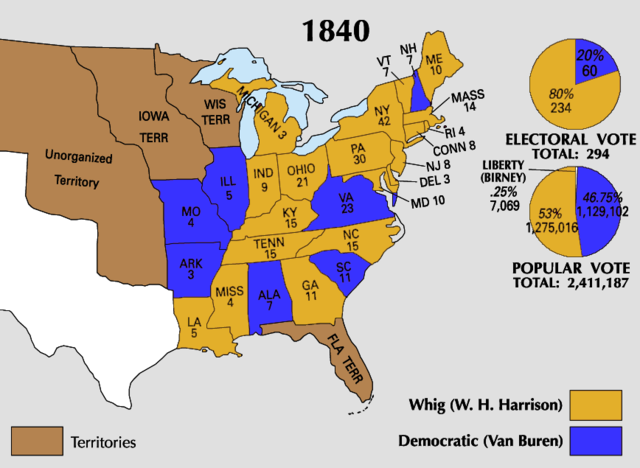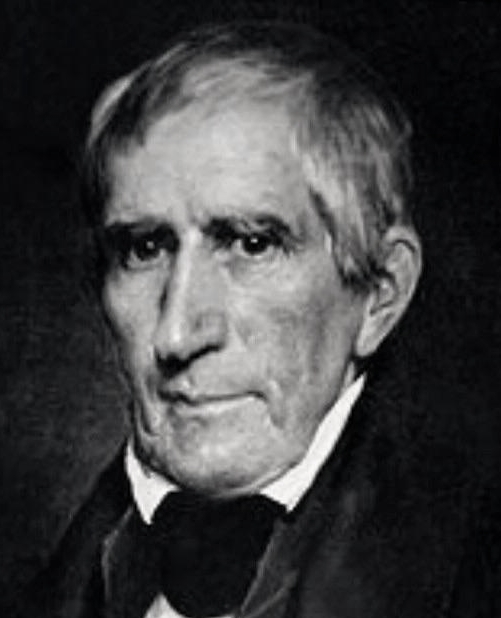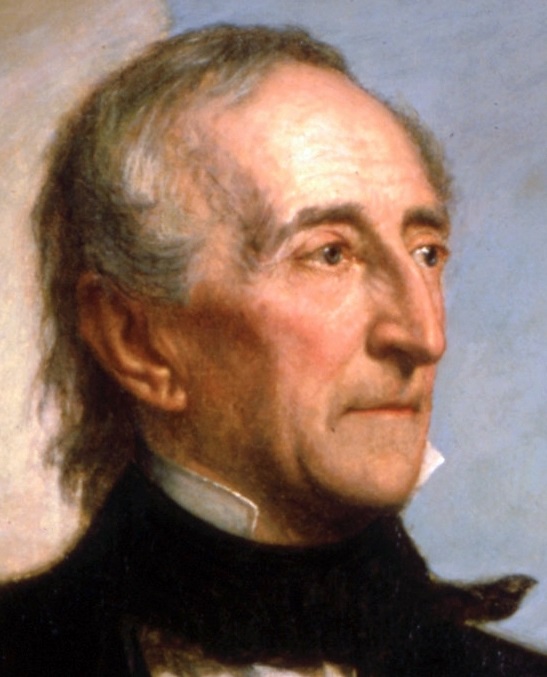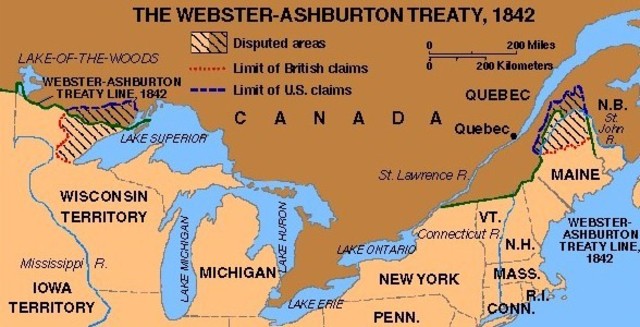|
|
 Tippecanoe and Tyler Too" Tippecanoe and Tyler Too"  The Webster-Ashburton Treaty (Canadian-American border) The Webster-Ashburton Treaty (Canadian-American border) The textual material on this webpage is drawn directly from my work America – The Covenant Nation © 2021, Volume One, pages 251-253. |

|
|
Even though by 1840 there were signs that the economy was beginning to recover (though the psychology of recovery takes longer to register among the people than the material fact of economic recovery itself), Van Buren faced a major uphill battle for reelection. His efforts to hold at arm's length the question of slavery had only alienated much of his following in the Democratic Party. Besides, he was facing the war hero of Tippecanoe, William Henry Harrison, who though he once was a states'-rights Democrat was now running as a moderate Whig. However what his precise views on politics happened to be was largely a mystery to most everyone. His running mate, the Virginian John Tyler, he too being a Whig moderate, was also hard to pin down as to where he actually stood on a number of issues. Thus the campaign slogan "Tippecanoe and Tyler Too" gave the American voter little idea of what a vote for this team actually would mean if they were successful. The importance of Tyler however would arise soon, for the aged Harrison caught a cold delivering his overly long inaugural address and died of pneumonia only one month into office. Tyler quickly cleared up the uncertainties of the Constitution about exactly what was to be the actual capacity of a vice president occupying a vacated presidency by assuming the title and the full powers of the presidency. Tyler's presidency however would be marked by controversy, much of it involving a personal rivalry which developed between Clay and himself. And it would first arise over the old question of the Bank of the United States (BUS), seemingly a source of constant controversy within American politics. Clay championed the bill for a new BUS – which Tyler vetoed, not liking some of the provisions concerning BUS lending to local bank branches (he actually was not opposed to the BUS in general). Clay pushed through another attempt, this time mostly as a personal challenge to Tyler, who vetoed it a second time. At this point Clay began to maneuver within the Whig party to undercut the party's own Whig president! Under the urging of Clay, the cabinet Tyler inherited from Harrison soon abandoned him. Within a short time he found himself being something of a political loner in the White House. High tariffs had been put in place in earlier years to protect the budding American industry from cheaper British industrial goods. But a schedule for the gradual reduction of those tariffs had been put in place at the same time, the presumption being that the industries would not continue to need such protection as they matured. But it had come to the point that these tariffs were a major source of income for the federal government. Consequently, a mood grew within Congress (under Whig domination) to delay putting into effect those tariff reductions. Thus the Whigs proposed new laws to postpone these scheduled reductions – which Tyler vetoed. Finally with a third attempt by Congress, Tyler agreed to some delay in the reductions, but under the conditions that federal monies would not be used to fund the operations of state governments. But this undercut the deal that Whigs had with the Democrats to keep them cooperating with the Whigs in Congress. The Democrats, seeing the potential loss of financial rewards for their state supporters, abandoned the Whigs in the 1842 election. The unhappy Democrats ran quite successfully by pointing out this loss to their voters. This in turn caused the Whigs to lose their place of leadership in the House, which the Democrats now took over. Tyler, of course, was blamed for it all.
|



| "Tippecanoe" Harrison died after only a month in office as U.S. president because he had spoken at length at his inauguration ... and caught a cold which turned into pneumonia. Now as president Tyler had constant problems with Congress: with Clay in competition for control of the Bank of the US (BUS) and his own Whig Party over the reduction (or not) of the huge tariffs scheduled to go into effect automatically. |

|
|
In the field of foreign relations Tyler was more
successful, backing his secretary of state, Daniel Webster, in
negotiating with the British diplomat, Lord Ashburton, a
Canadian-American border treaty ... while also confirming the 1818
agreement setting the border west of there to the Rockies along the
49th parallel. This treaty finally put to an end a number of crises that had occurred over defining exactly where the border was located between the U.S. and Canada (from Maine in the East to the Rocky Mountains in the West).1 1But the treaty left undefined the Canadian-American border west of the Rockies – that is, the Oregon Territory – which would remain in dispute until resolved by the Pakenham-Buchanan Treaty of 1846.
|



 Miles
H. Hodges
Miles
H. Hodges